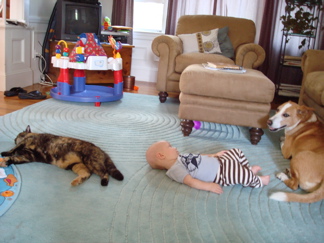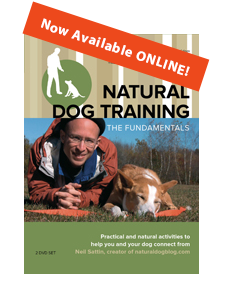In my life as a dog trainer, I'm often asked how long it will take for a dog to be "trained". There is, of course, the practical aspect to this question - dog owners wondering how many lessons they'll be signing up for, which is especially important to them since I don't teach in the simple "6 lessons with your puppy (and 15 other people) and then you're done" format. On the other hand, there's a deeper question being asked as well - often something like "when can I leave my dog home alone without my house getting chewed up?" or "when will my dog transform from Cujo into Lassie?" or "when will I be able to have my life back?" So let's talk about the process of getting your dog from point A (where they are right now) to point Z (where you want them to be) so you can have some realistic expectations around how much of your busy life you'll have to devote to training your dog.
Think for a moment about your own life. Let's say that you're learning how to play tennis. You learn the basic strokes, you learn how to serve, and you find a good friend with whom you can practice. Excellent! You get better and better. Then the winter comes around (or life circumstances change) - and you can't play for awhile. Let's say that it's a really LONG winter that lasts for 2 years (sometimes feels that way up here in Maine). Your friend calls you up with a "hey, wanna go play some tennis", and you're back on the court. Did you forget how to play in that time? Probably not. Are you going to be as good as you were when you were practicing regularly? That's almost a guaranteed no. Professional players, who aim for perfection, are practicing all the time.
Now let's talk horses for a moment. Horses are big creatures. I'm no biology expert, but I'm pretty sure that horses have larger brains than dogs have. That probably means that they're smarter, even. Have you ever worked with horses? If you have, then you know that horses always require training. Not that they forget the basics, of course - but whenever you work a horse you put it through its paces, starting with basic walking/trotting before you move on to galloping and jumping. It's an accepted part of working with horses, in fact, that on top of devoting a lot of time to love of your horse and care of your horse, you will also be devoting a lot of time to training your horse (if you're aiming for "perfection"). Just like the love doesn't end, neither does the training.
Are you getting where I'm headed with this line of thought?
We all strive for perfection with our dogs. We want a dog that always comes when called, that always lays down through dinner, that gets tackled by children without batting an eyelash. We want to be able to go to the dog park without worrying about aggression, and we want people to welcome our dogs into their homes lovingly, just like they welcome us (we hope). And we want it after having had 6 one-hour lessons when a dog is less than a year old, never having to think about it again.
I'm not sure what it is - the persistent mythology of Rin-Tin-Tin/Lassie/Benji/Old Yeller/etc., or just the memory we have of some dog that we met in our lives that was the "perfect" dog - but whatever it is, I think that it gets in the way of seeing our dogs for what they really are - live, imperfect creatures, doing the best they know how - just like us! I think it's kinda funny that your average person, who would have a hard time refusing a freshly baked chocolate chip cookie no matter what diet they're on, would still expect their dog to sit tight when a tasty morsel of food is dropped from the dinner table. "But he knows he shouldn't have it!" you exclaim. Is that so? Here, have another chocolate chip cookie.
Would you get mad at yourself if you lost a tennis match after a two-year hiatus? I hope not. Just like you with your tennis stroke, your dog needs practice doing things right. So while you will definitely see huge changes in your dog's behavior over the course of working consistently, it might be helpful for you to think of training not in terms of "how long?", but in terms of "how fun!" - in other words, as a game that you will play for as long as you are part of each others' lives. The more you play, the better you get - both in terms of doggie behavior and, more importantly, in terms of the relationship that you share with each other.
Maybe 10% of all dogs are those mythical, rock-solid dogs - who never need training, who are happy about everything in their lives, and who are welcome everywhere they go, no matter how crazy the circumstances. So if you have one of those dogs, consider yourself lucky. Most people, obviously, don't have a dog like that - so if your dog isn't like that, consider yourself NORMAL. However, within a couple months of working with your dog consistently, by transforming yourself into the moose instead of the alpha, by helping your dog relax in moments of stress, you'll have created a strong foundation for the lifelong relationship that I'm talking about. The one where your dog always comes when called. The one where nothing gets bitten, and where barking only happens when it's supposed to happen. The one where you regularly spend quality time together, enjoying how miraculous it is that two creatures so completely different can share a relationship so special. And imperfect. Now go have a cookie - I know you want one. 🙂





